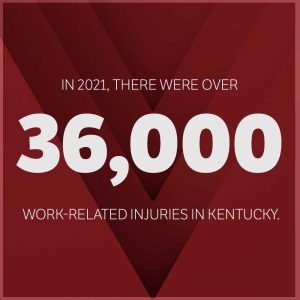

In 2021, there were over 36,000 work-related injuries in Kentucky. That’s a rate of about 3,100 incidents for every 100,000 full-time employees. While this number has been on a steady decline, the average is still higher than the rest of the country.
Some injuries sustained on the job are more severe than others. It is even possible that your injury will leave you unable to perform your job duties as you did before the incident occurred. What happens if you can’t return to work after an injury? This blog will explain the details of the workers’ compensation process and what you need to do if you are injured and unable to work.
The Workers’ Compensation Process
If you have been injured in an incident while at work, you may be in the midst of the workers’ compensation process now. In other words, the following events have already occurred:
- You received immediate medical attention.
- You notified your supervisor and filed an incident report.
- You gathered evidence, such as photos or witness reports.
- Your employer filed a claim with the DWC (Department of Workers’ Claims)
- After 7 days off work, you qualified for TTD (Temporary Total Disability) benefits. These are calculated to be an amount that is ⅔ of your average weekly wage. In 2023 the minimum amount is $203.35, and the maximum is $1,118.43.
- Once you missed more than 2 weeks of work, you were also paid for the first 7 days.
If your injury is severe, life-changing, and prevents you from returning to your old job, you may be wondering what to do next. The workers’ comp rules are not easy to understand or to navigate, so you will benefit from the counsel of a lawyer with experience and a proven track record in this specialty field.
Can I Be Forced to Return to Work After an Injury?

You should understand that if you are not able to return to work, you cannot be forced. Your doctor is the person who will determine what you are able to do, and your employer cannot override your doctor’s assessment.
Fortunately, in Kentucky, you are allowed to use your own doctor to treat you after a work-related injury. If your employer uses a managed health system, you can choose one of the doctors in the program; however, you are allowed to continue treatment with whichever doctor began emergency treatment if you want to.
Your TTD benefits will continue until your doctor determines that you have reached your maximum medical improvement (MMI). This means that your condition has stabilized and that you are no longer improving (or expected to improve).
What If I Can’t Return to Work After Reaching My MMI?
Your doctor will determine whether or not you can return to work after you have reached your maximum medical improvement. A relevant question that weighs heavily on many injured workers is, “Can workers’ comp cut you off?” Once you reach MMI, you are no longer temporarily totally disabled – you may be either permanently partially or permanently totally disabled. If a doctor has placed you at MMI, your TTD benefits will stop.
Before you can receive any additional benefits, we have to determine whether you are eligible for either Permanent Partial Disability (PPD) benefits or Permanent Total Disability (PTD) benefits, and the amount of any additional benefits owed to you.
Permanent Partial Disability
You may have a Permanent Partial Disability (PPD) even if you have returned to the same job you were doing prior to the accident. Or, you may have restrictions as a result of the injury that prevented you from returning to the same job but you are back to work with a different employer.
PPD benefits will be paid over a period of either 425 weeks or 520 weeks, depending on certain factors. To qualify for this type of benefit, a doctor must assign you an impairment rating, using the AMA (American Medical Association) Guide to the Evaluation of Permanent Impairment, 5th Edition. If you have a permanent disability rating of 50% or less, you will receive your PPD benefits for up to 425 weeks (just over 8 years). If your rating is over 50%, the benefits can continue for up to 520 weeks (10 years). In either case, the payments will stop once you reach the age of 70, or 4 years after the injury, whichever is later.
The actual amount of your benefit is also determined by a complicated formula. It begins with ⅔ of your weekly salary which can be enhanced by various multipliers such as your age, percentage of impairment, education level, income, and other factors.
Permanent Total Disability
If your injury is so severe that you can no longer work at any type of job, you will receive 66 ⅔ of your average weekly salary until you reach the age of 70, or 4 years after the injury, whichever is later.
With both PPD and PTD, you may reach a settlement with the workers’ compensation insurance provider. This means that your workers’ compensation lawyer will negotiate a lump sum settlement. This settlement will take various factors into account, including your future medical expenses, your lost wages, and the extent of your disability. Sometimes, if a settlement cannot be reached then an Administrative Law Judge will hear your case and make a decision on your entitlement to benefits.
Consult a Kentucky Workers’ Compensation Attorney
If you can’t return to work after an injury, it is crucial to understand your rights in Kentucky. You cannot be forced to return to work against your doctor’s recommendation. Although you will have mounds of paperwork, assessments, and complicated mathematical formulas in your future, they can all be handled by the experienced workers’ compensation lawyers at McCoy & Sparks Attorneys at Law. This will allow you to focus on learning to live with your disability and to relax about your financial future.
Call us at 844-459-9467 to contact the trusted attorneys at McCoy & Sparks for a risk-free consultation to discuss your injury and how to navigate the maze of workers’ compensation legislation. They will help you receive the settlement that you are entitled to.

